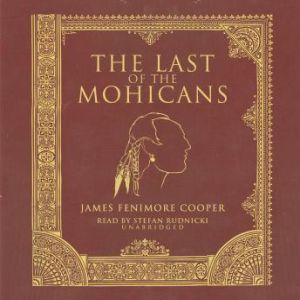

The Last of the Mohicans
Author: James Fenimore Cooper
Series: The Leatherstocking Tales #1826
Narrator: Stefan Rudnicki
Unabridged: 22 hr 54 min
Format: Digital Audiobook Download
Publisher: Blackstone Audio, Inc.
Published: 02/17/2009


Author: James Fenimore Cooper
Series: The Leatherstocking Tales #1826
Narrator: Stefan Rudnicki
Unabridged: 22 hr 54 min
Format: Digital Audiobook Download
Publisher: Blackstone Audio, Inc.
Published: 02/17/2009
James Fenimore Cooper (1789-1851) was America's first successful popular novelist. Son of the prominent federalist William Cooper, founder of the Cooperstown settlement, James was educated at Yale in preparation for a genteel life as a federalist gentleman. After his father's death in an 1809 duel, Cooper quickly squandered his inheritance, and at thirty was on the verge of bankruptcy. He decided to try his hand at writing. His first novel, Precaution, a domestic comedy set in England, lost money, but Cooper had discovered his vocation.
Cooper established his reputation after his second novel, The Spy, and in his third book, the autobiographical Pioneers, Cooper introduced the character of Natty Bumppo, a uniquely American personification of rugged individualism and the pioneer spirit. A second book featuring Bumppo, The Last of the Mohicans, quickly became the most widely read work of the day, solidifying Cooper's popularity in the United States and in Europe.
Cooper was a prolific writer, publishing thirty-two novels, twelve works of nonfiction, one play, and numerous pamphlets and articles. His most lasting contributions to American literature were his five books about Natty Bumppo. Later anthologized as The Leatherstocking Tales, they are best read in the order in which they were written: The Pioneers, The Last of the Mohicans, The Prairie, The Pathfinder, and The Deerslayer.
What can one say about Cooper? His historical imagination is profound, his creative use of the gothic landscape is uniquely American, and his influence on plot and characterization in American fiction--including, I recently discovered, South American fiction--is pervasive and extensive. Yet his dict......more
Note: I've just edited this review slightly to correct a chronological typo. When I read this book the first time, I was nine, not seven years old --I knew, when I wrote the first draft of this review, that I was in 4th grade the first time, so I don't know what I was thinking when I typed "seven!" T......more